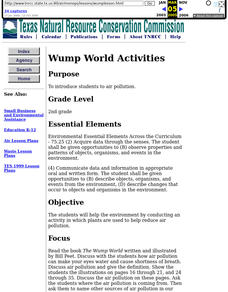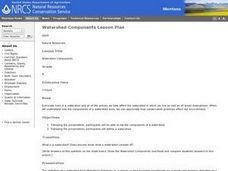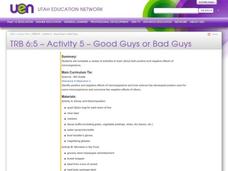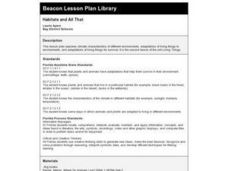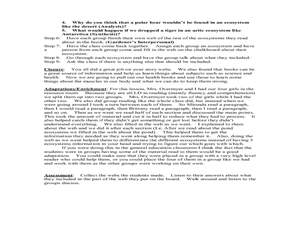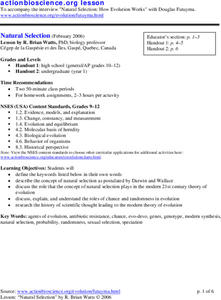Curated OER
Bacteria
In this bacteria learning exercise, students fill in the blanks with the correct word. Students then label the structures found on a bacterium.
Curated OER
Compost in a Bag!
Fourth graders experiment to see which objects decompose. In this compost lesson, 4th graders observe the changes of labeled objects in a bag. Leave the objects for one month and record the changes by observation and weight. Students...
Curated OER
Web of Life
Students construct a web of life. In this ecosystem lesson plan students are introduced to ecosystems and life cycles. Insects are the main focus.
Curated OER
Bat Facts
Student's demonstrate an understanding of basic facts about bats by creating a picture representation of bats in their habitat describing information they learned. The lesson is especially favorable for visual learners.
Curated OER
Exploring Bats
Third graders create a graphic organizer about bats in cooperative groups. The graphic organizer is used to illustrate the information that has been researched. The specific graphic organizer is the KWL.
Curated OER
Wump World
Second graders read ead the book The Wump World written and illustrated by Bill Peet. Discuss with the students how air pollution can make your eyes water and cause shortness of breath. Students discuss air pollution and give the...
Curated OER
Coal and The Kentucky Economy
Students read about and study what an economy is. Students then answer questions that require them to define what an economy is and list the components of a healthy economy. Students also list two ways that coal helps the Kentucky...
Curated OER
Mission 6: Renewable Energy
In these renewable energy worksheets, students learn about renewable energy and energy sources. Students complete a 23 page packet for the activity.
Curated OER
Dirt: Making Dirty Water Clean!
Fourth graders study soil and water. In this water lesson students work in groups and use a filter to clean water.
Curated OER
Watershed Components
Eighth graders examine the components of a watershed. They view overheads, discuss the hydrologic cycle, and observe a demonstration of a soil erosion box.
Curated OER
Good Guys or Bad Guys
Sixth graders complete a variety of activities to explore both positive and negative effects of microorganisms. They, in groups, engage in a series of experiments which illustrate the effects of certain molds.
Curated OER
Water Cycle in a Bottle
Students study the water cycle. In this water science lesson, students complete a water cycle experiment using soda bottles.
Curated OER
Florida's Springs
Students calculate the water usage for irrigation of school grounds. They use maps in determining which areas are irrigated.
Curated OER
It's all Interconnected
Learners participate in a number of activities to investigate the food web, species extinction, predators and prey, and biological diversity.
Curated OER
Habitats and All That
First graders read books, complete online explorations and discuss the ways in which animals adapt to their habitats in order to survive. They create accordion books, play matching games and dramatize animal adaptations.
Curated OER
Endangered Species of PA
Students research and publish information about an endangered species on the school's web site. In this endangered species lesson, students choose an at-risk species to research. They publish their research information on the school's...
Curated OER
Biogeochemical Cycles
Students research an assigned biogeochemical cycle. In this cycle activity, students need to determine that all cycles need energy to continue. The students will look at a given cycle to describe it, research and draw an assigned cycle,...
Curated OER
Obtaining Food -- The Impact of Over-fishing
Students play a fishing game. For this food supply lesson students regulate their fishing in a game about over-fishing. The students identify resources that could be extracted from that biome.
Curated OER
Graphic Organizers Aid Comprehension
Students create story webs to aid comprehension of ecosystems. In this reading strategies lesson plan, students discover the importance of organizing information while reading a nonfiction text. Students produce story webs to communicate...
Curated OER
Natural Selection
Students use discussion questions, handout information and research topics to explore several issues related to natural selection and evolution. They examine Darwin's research on the finch and antibiotic resistance.
Curated OER
Animals
First graders study the basic needs of animals and compare them to human needs. They make bird feeders using milk carton and pine cones. They review the basic needs of food, water, air, and shelter and discuss what happens when animals...
Curated OER
Insect Food Chain & Camouflage
Students use art work to demonstrate their understanding of the insect food chain and their ability to camouflage themselves. In this insect food chain and camouflage lesson, students determine what type of animals feed on insects. They...
Curated OER
Making Paper
Students brainstorm why trees are important to humans and the value of forests. They then participate in making paper in class. They may decorate the paper adding glitter, dried flowers, etc.
Curated OER
How Do Organisms Vary?
Students study variation of organisms. They determine this variation arises from genetic and environmental causes.







